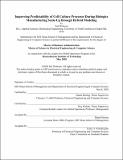Improving predictability of cell culture processes during biologics manufacturing scale-up through hybrid modeling
Author(s)
Wolszon, Zoë.
Download1191224752-MIT.pdf (1.267Mb)
Other Contributors
Sloan School of Management.
Massachusetts Institute of Technology. Department of Electrical Engineering and Computer Science.
Leaders for Global Operations Program.
Advisor
Duane Boning and Roy Welsch.
Terms of use
Metadata
Show full item recordAbstract
In the biotechnology industry, commercial manufacturing of biologic drugs occurs in large-scale production bioreactors (15,000L), but process development occurs in lab-scale production bioreactors (2-3L). Cell culture processes are complicated and the scale-up from bench-scale to commercial-scale can be unpredictable. This study develops an algorithmic approach to better predict the performance of a production bioreactor at commercial scale. A hybrid modeling approach is explored using historical process data and calculated equipment engineering features that characterize the bioreactors at each scale. The study reveals that current process characterization regression models cannot predict commercial-scale performance better than the mean, and that machine learning approaches can improve this performance. Engineering features are found to have a relatively small impact that varies by response variable, but paradoxically are often retained in feature selection of top-performing models. Several new hypotheses arise from these findings, revealing the need for further work with an expanded multi-process multi-scale data set. The researchers propose that by training the model on such a robust data set, it will be possible to test these new hypotheses and unlock significant potential to reduce risk, costs, time, and resources required to develop, commercialize, and manufacture new biological drugs.
Description
Thesis: M.B.A., Massachusetts Institute of Technology, Sloan School of Management, in conjunction with the Leaders for Global Operations Program at MIT, May, 2020 Thesis: S.M., Massachusetts Institute of Technology, Department of Electrical Engineering and Computer Science, in conjunction with the Leaders for Global Operations Program at MIT, May, 2020 Cataloged from PDF version of thesis. Includes bibliographical references (pages 87-89).
Date issued
2020Department
Sloan School of Management; Massachusetts Institute of Technology. Department of Electrical Engineering and Computer Science; Leaders for Global Operations ProgramPublisher
Massachusetts Institute of Technology
Keywords
Sloan School of Management., Electrical Engineering and Computer Science., Leaders for Global Operations Program.